Back With a Bang (and a Few Lost Jumpers)
What a wonderful start to the new school year! Year 1 have amazed me with how ready and eager they’ve been to learn. It’s been lovely to see friends back together, sharing smiles and settling back into school life.
The classroom may look a little bit different this year but the children have embraced the changes brilliantly (even though some of the adults around school are still adjusting). They’ve worked so hard learning new routines: classroom transitions, tidying up, lining up, which way round to put on a jumper after PE…
I’m especially proud of the way the children have taken so much pride in their learning. If week 1 is anything to go by, I’m very excited for the next 38!
Well done, Year 1! You’ve certainly helped to make my first week back a happy and healthy one.
A few reminders:
- Reading books
We will continue to use the Collins Hub e-book platform though the children have new log-ins. We are currently experiencing some access issues which we’re working to fix as soon as possible. Thanks for your patience!
- NumBots
NumBots is a valuable resource and a fantastic way of keeping home learning fun. If you need any technical support (or a reminder of login details), please be in touch and I’ll try my best to help.
- PE days
Our PE days are Tuesday and Thursday.
- Water bottles
Please make sure your child comes to school with a clean, labelled water bottle every day. Water bottles must go home every day.
- Uniform
All the children have looked so smart to start this year and uniform compliance has been fantastic. We have, of course, had a great deal of jumper/cardigan admin to contend with! Please label your child’s clothes – it helps us and you. Thank you.
If you need any additional support, you can email me on ajnash@spherefederation.org
Help at home by celebrating a fantastic start to Year 1. What has your child learnt this week? What’s different about Year 1? Has anything stayed the same?
Thanks,
Mr Nash
Goodbye and Thankyou
We’ve had a lovely last morning together in Year 1. The classroom was filled with smiles and laughter as we spent time reminiscing about all the fun, learning and memories we’ve made throughout the school year. From our very first day to all the exciting moments in between, it was heart-warming to look back and see how far we’ve come.
To celebrate our journey, we also created our very own Year 1 graduation hats! The children were so proud of their creations and it was a joyful way to mark the end of a fantastic year.

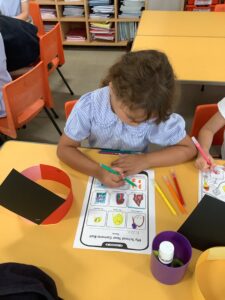
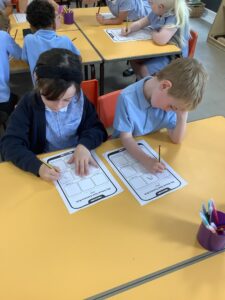


I’m really going to miss seeing their smiling faces each morning. Wishing everyone the best of luck in Year 2!
A big thank you to all the parents and carers for the lovely gift — it’s truly appreciated.
Have a fantastic summer!
From,
Mrs Palmer
Being Healthy in Year One
This week, Year One have been busy exploring what it means to be healthy, for both our minds and our bodies!
We started the week by talking about mental wellbeing and how to manage big emotions in a healthy way. Together, the children created a beautiful new class glitter bottle, which they designed to show what it can feel like when our emotions feel a bit overwhelming and how, just like the glitter settles, we can calm ourselves using deep breaths, taking a quiet moment, or simply stepping away for a short break. I’ve been incredibly proud of how maturely the children shared their feelings and how respectfully they listened to each other’s thoughts and ideas.
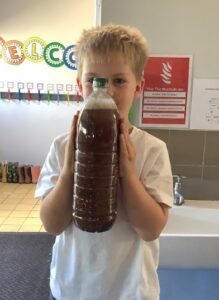
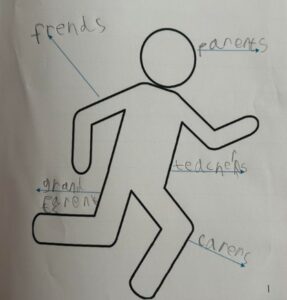
We also learned about looking after our physical health discussing the importance of eating well, staying active and taking care of our bodies. The children thought about all the different people who help them stay healthy and came up with some fantastic ideas for keeping active at home and at school. They were quite surprised to find out they should aim for at least 60 active minutes every day although we all agreed they definitely get plenty of that during the school day!
It’s been a really thoughtful, creative and energetic week, and I’m so proud of all the children for their enthusiasm and care in learning about such an important topic.
Living and Learning: Being Healthy
We kicked off our Being Healthy themed week with an energetic morning of Football and Tri Golf! The children were amazing – they worked brilliantly as a team and showed great respect to the coach with their fantastic listening skills.
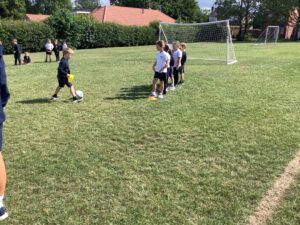
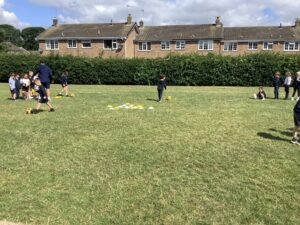
In the classroom, we’ve been learning all about health and prevention. We’ve had some great discussions on topics like sun safety, healthy eating, what is a vaccine and how does it work? and how to stay clean and healthy. Together, we explored the following areas:
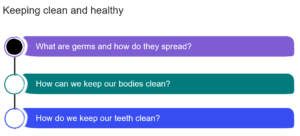
Help at home:
This week, try one of these easy jobs at home:
☀️ Sun Safety: Help remind someone to wear a hat or put on sun cream when outside. Why do we need to protect our skin?
🦠 Germs: Help remind your family to wash their hands before meals and after playing outside. Can you show how to wash hands well?
🧼 Keeping Clean: Help brush your teeth carefully for two minutes. Can you explain why brushing teeth is important?
Transition To Year 2
Yesterday morning, we had our special transition morning where we met our teachers next year (who are very excited to be with us).
This was a great opportunity for the children to tell us all about themselves and what they enjoy doing most.
Whilst Mrs Bye is already very familiar with the soon to be year 2s, I (Miss Gledhill) loved seeing how positive the children were about themselves, learning and each other!
The children were all fantastic and we can’t wait for September!

Topic – Design and Technology
This week, we designed and built a brand-new chair for Baby Bear! Working brilliantly in our groups, we focused on making sure our chairs were strong and stable. After testing them out, we were thrilled to see that every single chair was able to support Baby Bear’s weight – a fantastic success!








When I grow up…
Rocksteady Music School!
St James had a very exciting visit from Rocksteady Music School this morning. The key focus of the visit was to engage pupils in music, to learn about various instruments and how to play them. We started the morning with a whole school assembly, where the children learnt all about what it takes to be in a band – we also got to sing along to some of the latest hits! Then, KS1 and KS2 had separate workshops where a pupil band was put together in just 30 minutes! There was lots of resilience, teamwork and happiness shared all morning, particularly when learning to keep a consistent tempo!
We are aiming to introduce more musical connections at St James next year. Rocksteady have given us confirmation that children would really benefit from this. There will be a letter sent home later in the week with more information on musical opportunities in September.



Temple Newsam Home Farm Visit
We had a wonderful day out at Temple Newsam Farm today! We were lucky enough to see lots of amazing animals — including some adorable piglets that had been born just this morning.
The children were fantastic! They showed great respect for the animals and asked some thoughtful, curious questions.
During our workshop, we learned all about different materials and even had a go at building our own structures using wood. It was a fun, hands-on way to explore how things are made!










Topic – Design and Technology
We’ve been experimenting with different 3D shapes to find out which one is the strongest.

Through our testing, we discovered that the cylinder was the strongest individual shape—it held an impressive 26 books before collapsing.
Next, we each built a cylinder, then combined our cylinders as a group to test if a team structure could hold more books than a single one.

Together, our group’s structure held over 50 books!
Then we took it a step further and combined all the cylinders from every group to build a superstructure. Amazingly, this superstructure supported more than 80 books.

From our investigation, we learned that a strong, stable structure usually has three important features:
-
Low height
-
Wide base
-
Flat base
We also found that adding more cylinders helped distribute the weight more evenly, allowing the structure to hold significantly more books.
Help at home: Can you remember the three key features to create a stong, stable structure?


